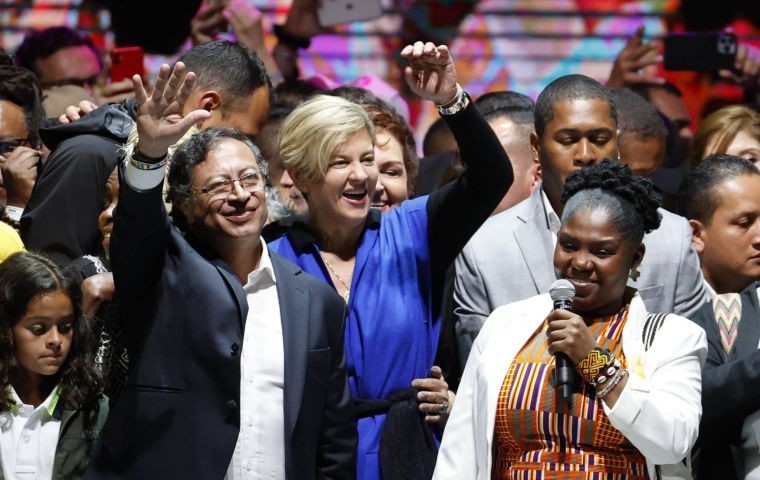MercoPress. South Atlantic News Agency
Third-time lucky Petro to lead Colombia's turn to the left
 It was Petro's third attempt at the presidency
It was Petro's third attempt at the presidency Colombia elected a leftist government this Sunday for the first time after the second round of elections. Gustavo Petro, candidate of the Historical Pact coalition, will be the country's next president after a ballotage with good participation figures where he imposed over the right-wing populist Rodolfo Hernandez, who was a candidate of the League of Anti-Corruption Rulers.
The Current Senator and former mayor of Bogotá and former M-19 guerrilla member won with 50.88% of the votes against Hernández's 46.85%. Joining Petro as Vice President will be the 46-year-old lawyer and environmentalist advocate of African ethnicity Francia Márquez.
Hernández was ahead in most polls after barely reaching the runoff but his latest announcements of more working hours to the people gave Petro his scepter on a platter.
Petro urged Colombians to celebrate “the first popular victory” and Hernández asked the president-elect to be “faithful to his speech against corruption.”
“I called Gustavo Petro to congratulate him as president-elect of Colombians. We agreed to meet in the coming days to begin a harmonious, institutional and transparent transition,” incumbent President Iván Duque said on Twitter.
More than 39 million voters were eligible to vote in the second round of the presidential election. The polls, which opened at 8:00 a.m. (1300 GMT), closed at 4:00 p.m. (2100 GMT) and the counting of votes began immediately.
It was Petro's third attempt at the presidency. An economist by trade, he left his guerrilla past behind him when he signed the peace accords of the 1990s).
Petro had won the first round with 40% of the votes, while Hernández harvested 28% but was banking on traditional right-wing voters to make the difference, including the endorsement of Federico “Fico” Gutiérrez, who failed to make the cut in the previous round despite his own support from former President Álvaro Uribe.
In this scenario, Colombia's traditional parties were spared from the race, as had happened in Chile. At the end of the day, Colombians had to pick between a millionaire without a party and with a sizeable judicial dossier in his name against a former guerrilla fighter and Mayor of Bogotá.
Petro's proposed economic and social reforms to fight poverty, inequality, and exclusion captivated millions among the poor but spooked businessmen and would-be investors.
The president-elect pledged in his campaign to start peace negotiations with the National Liberation Army (ELN) guerrillas, to implement the 2016 peace agreement with the demobilized FARC guerrillas, including dissidents who returned to armed struggle, and to seek the subjugation of criminal gangs involved in drug trafficking.
The country is still mired in a nearly six-decade-long internal conflict that has left 260,000 dead, despite a peace agreement that allowed 13,000 FARC members to lay down their arms, reintegrate into civilian life and form a political party.
However, Petro will have to seek alliances in Congress to get his economic and social reforms approved since he does not have a majority of his own despite a performance in the legislative elections in March.
Under Petro, Colombia will join Chile, Mexico, and Peru where leftist leaders rule.
Hernández still faces an investigation for allegedly intervening in the awarding of a garbage management contract while he was mayor of Bucaramanga. Although the contract was not signed, it was intended to benefit a company and one of his sons who had lobbied in favor of the company.
Some 300,000 members of the Armed Forces and National Police guarded the elections and protected more than 12,500 polling stations to counter possible attacks by illegal armed groups. Defense Minister Diego Molano said an investigation had been launched into the murder of an electoral witness in the municipality of Guapi, in the department of Cauca.




Top Comments
Disclaimer & comment rules-

Read all commentsArticle says...:
Jun 20th, 2022 - 12:00 pm 0“Hernández was ahead in most polls after barely reaching the runoff but his latest announcements of more working hours to the people gave Petro his scepter on a platter.”
I say...:
Hmmmmmm...
I Tænk that the publication of the linked video below..., that shows Hernandez and his two sons “Working Hard”..., controlling the “Work Quality” of some 11 “Hard Working” bikini clad females on a Yacht party in Miami, Florida, USA..., all paid by the “Hard Working” Pfitzer Pharmaceutical Company may have given Petro his scepter on a platter...
https://m.youtube.com/watch?v=x6C1DeXK4JM
Capisce...?
Commenting for this story is now closed.
If you have a Facebook account, become a fan and comment on our Facebook Page!